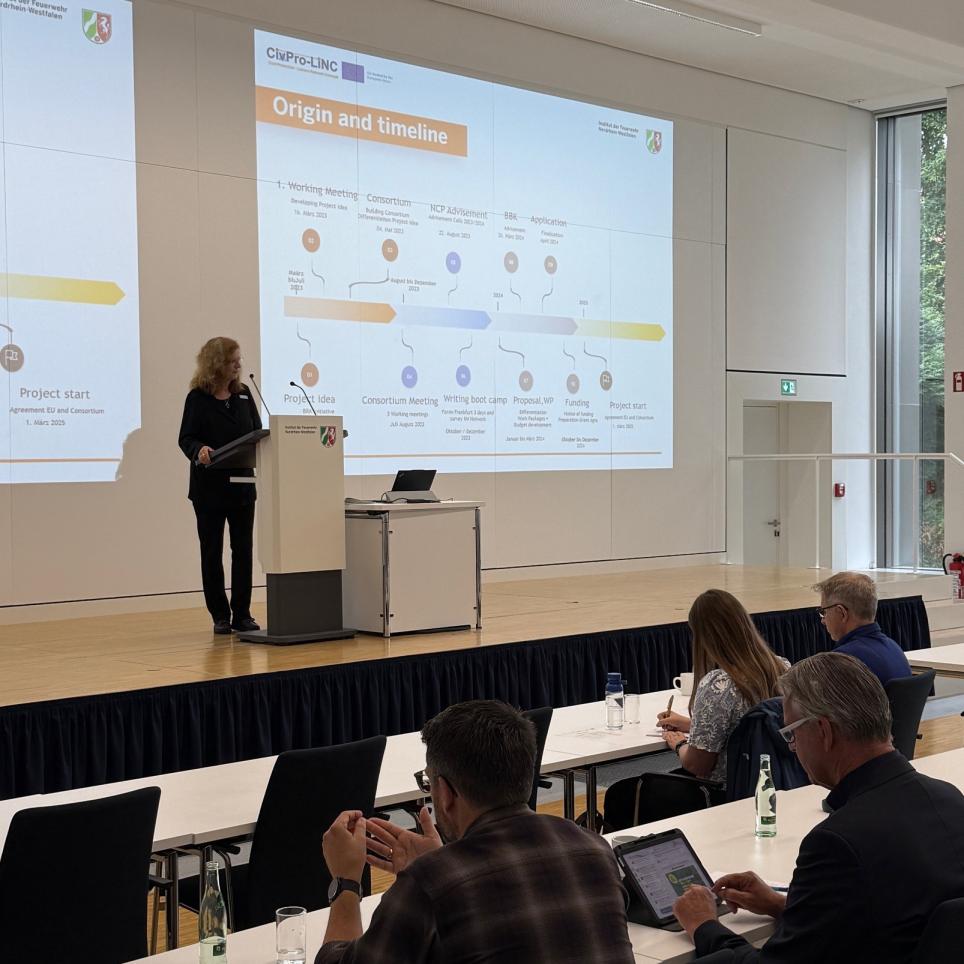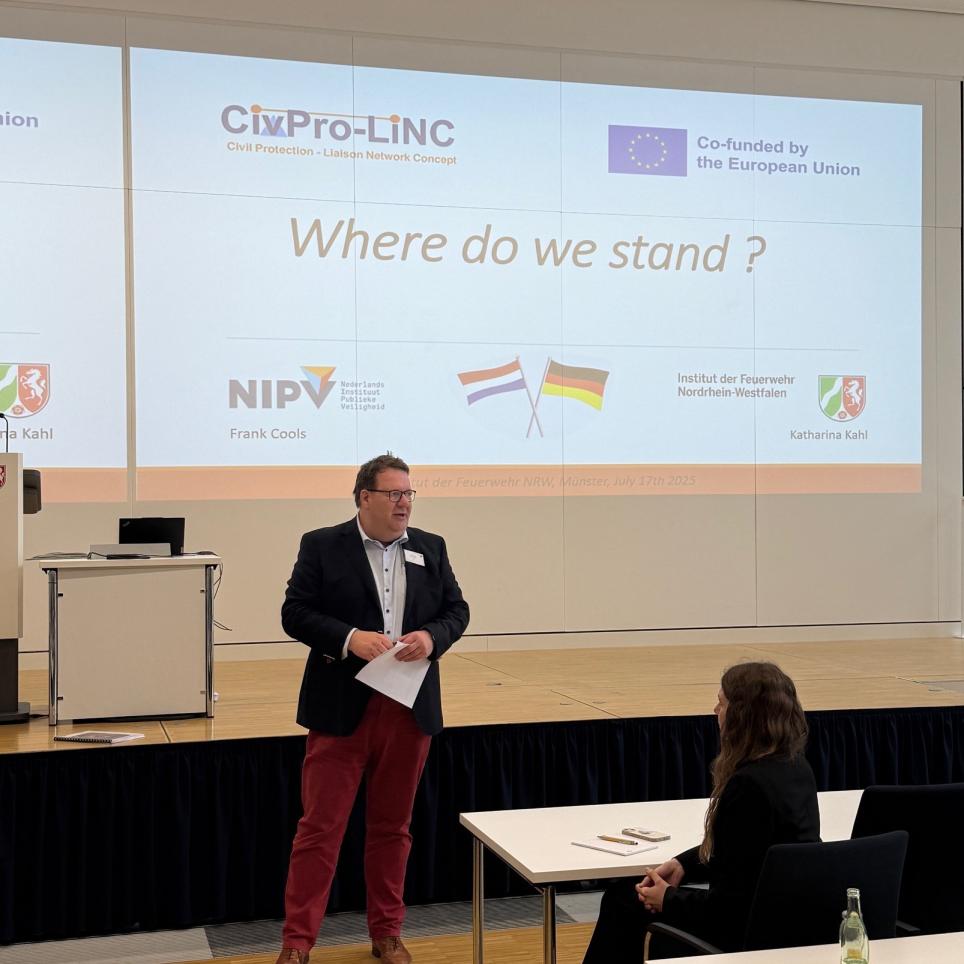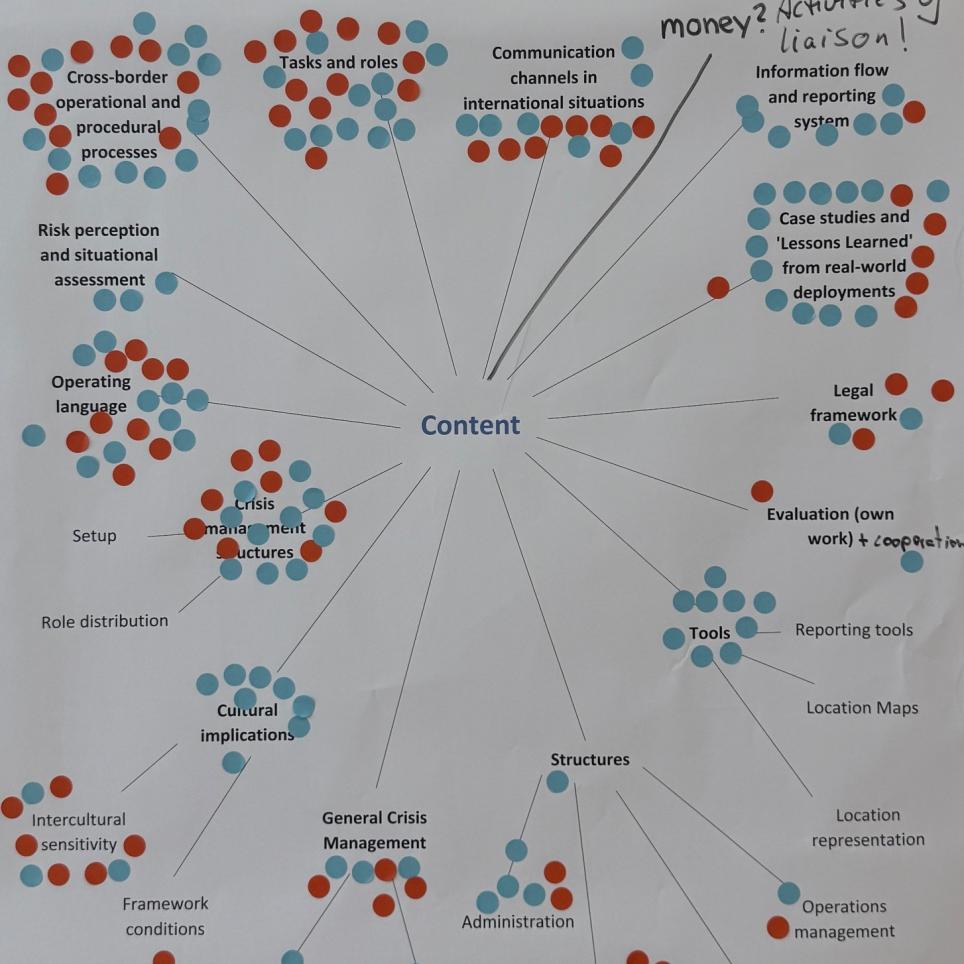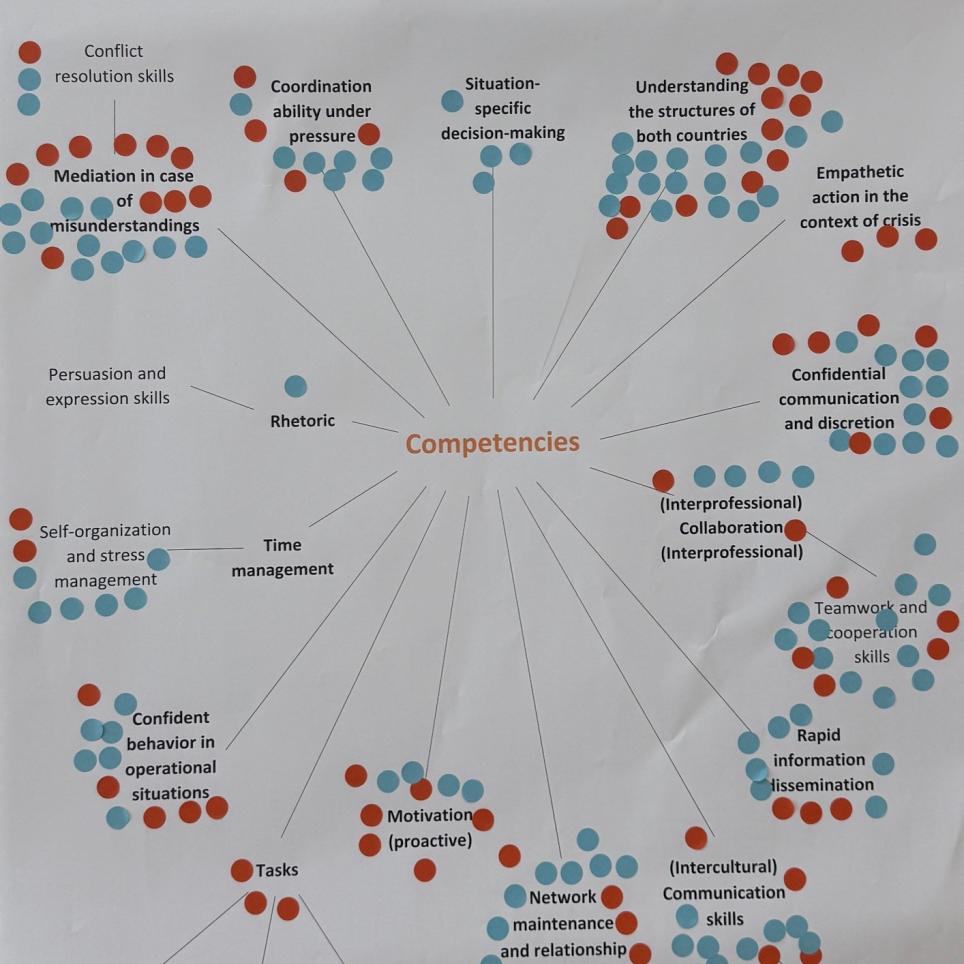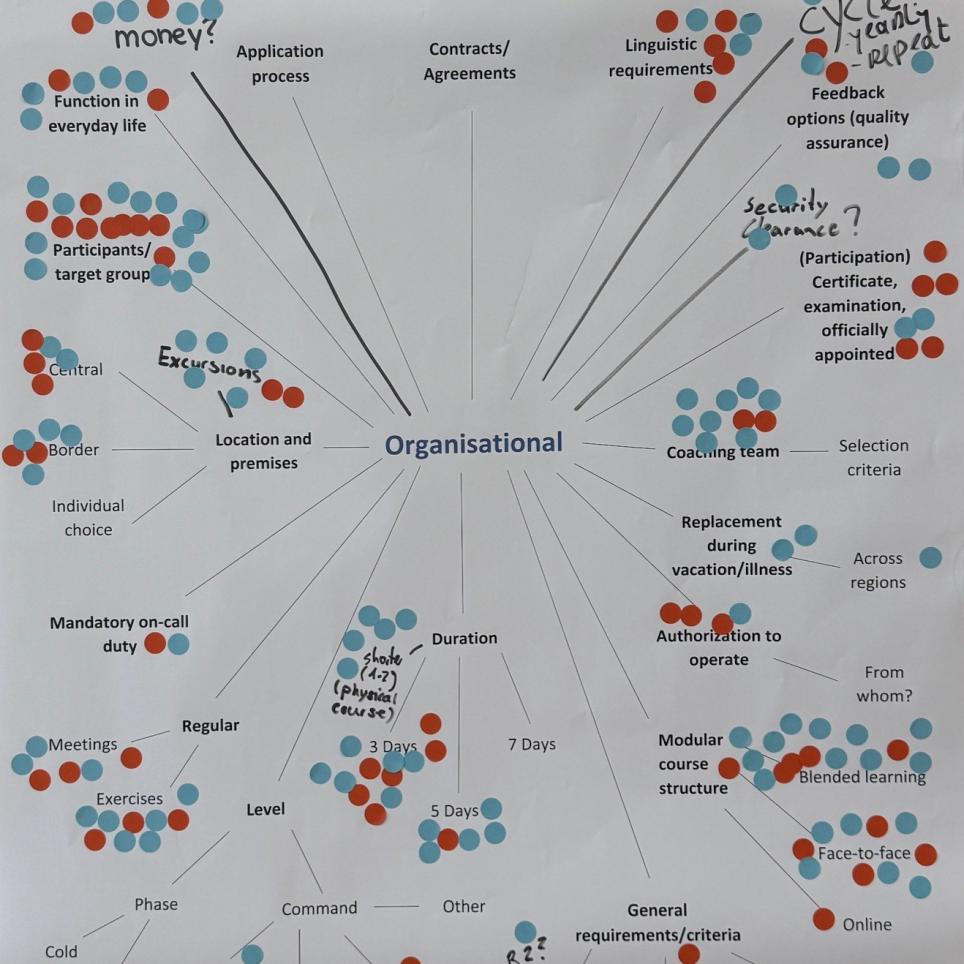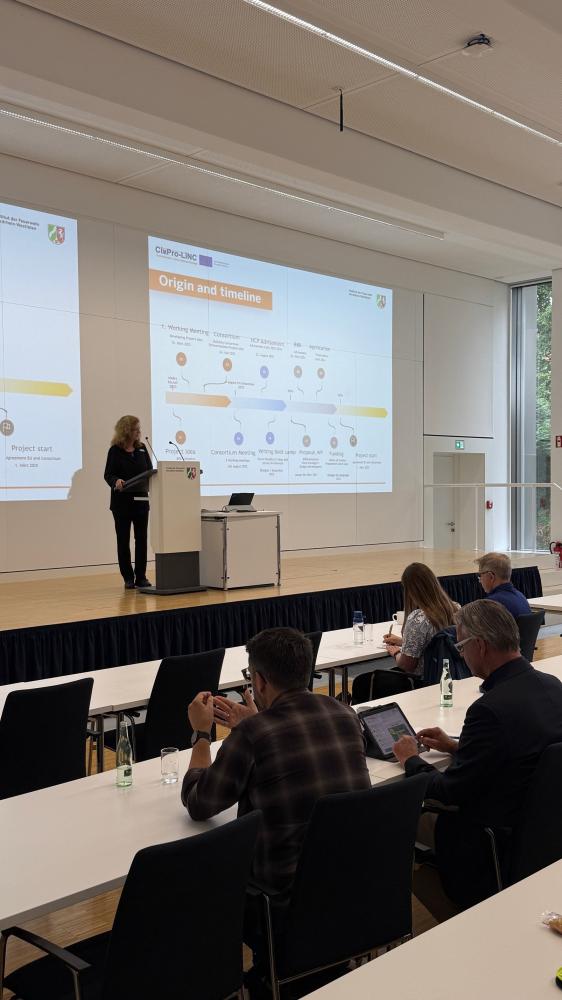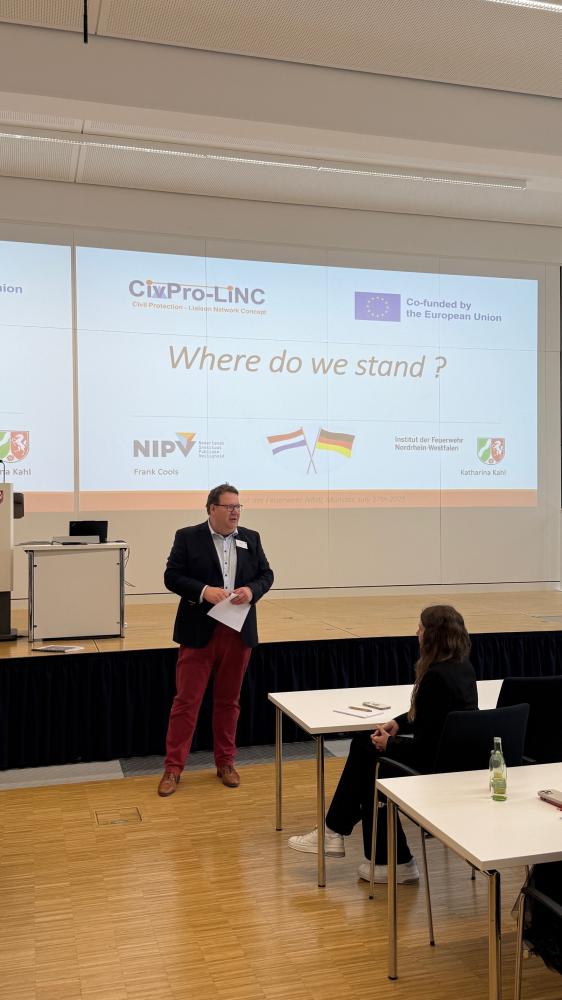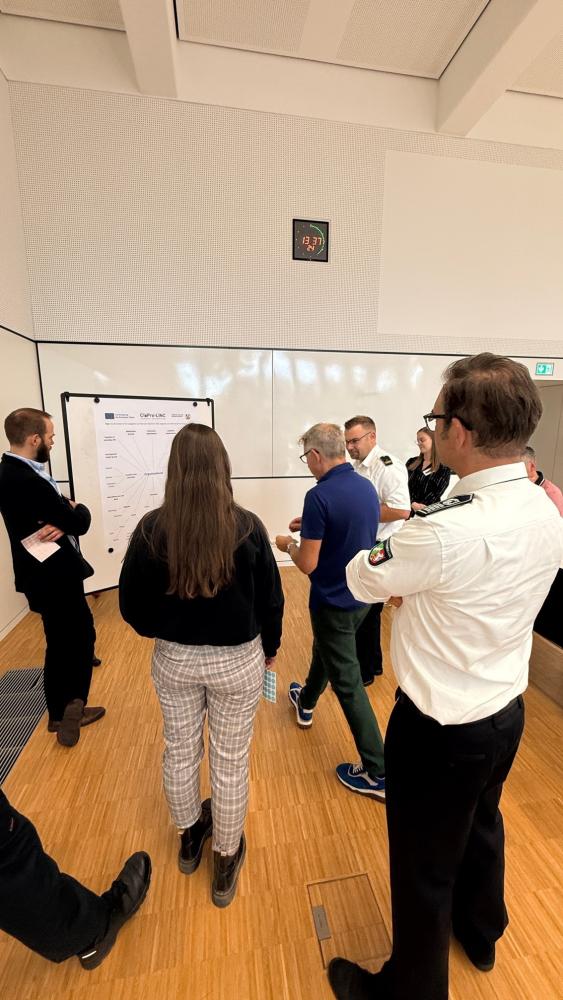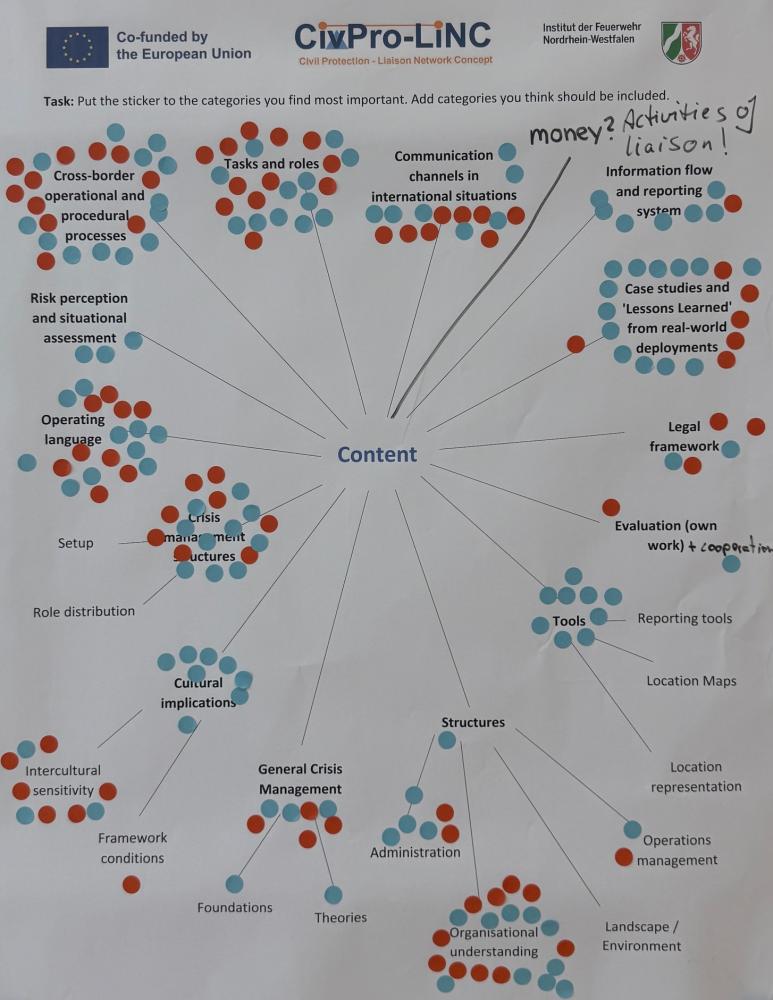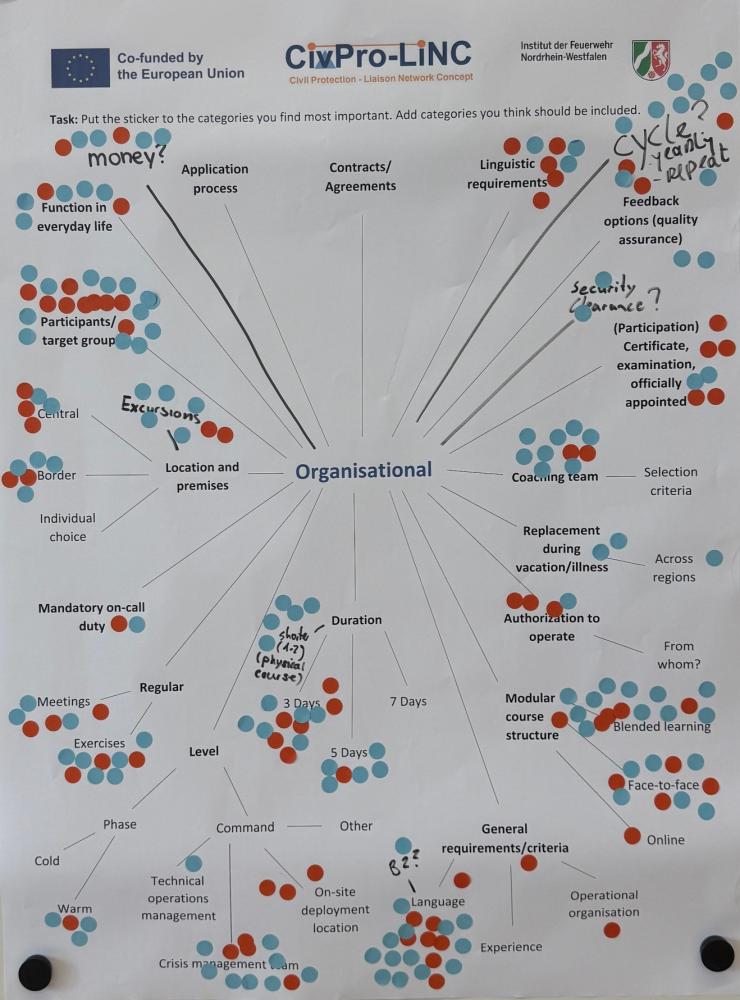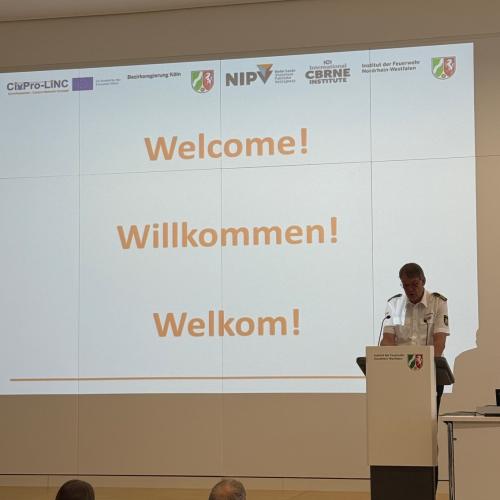
Executive summary
1st stakeholder meeting in the CivPro-LiNC project - for better cooperation in European civil protection
In March, the go-ahead was given for the project funded by the EU as part of the so-called KAPP Call. Its aim is to improve civil protection cooperation in European border regions through the deployment of liaison officers - especially in smaller, regional emergencies that fall below the threshold for the activation of the EU Civil Protection Mechanism (UCPM).
CivPro-LiNC is based on:
- Development of a European training module for liaisons
- Creation of a handbook for liaisons on cooperation in border situations
- Establishment of a cross-border liaison network
In the future, liaisons shall build professional, organizational and cultural bridges - both in preparation for deployment and in acute situations.
The district government of Cologne is the lead partner coordinating the project, which is being realized in close cooperation with the Institue of the Fire Service North-Rhine Westphalia (IdF NRW), the Dutch Institute for Public Safety (NIPV, Netherlands) and the International CBRNE Institute (ICI, Belgium).
In order to obtain as many perspectives as possible on cross-border work and to generate practice-oriented content, CivPro-LiNC attaches great importance to the participation of experts. To this end, the 1st stakeholder meeting was held at the IdF in Münster on July 17, 2025.
The current project status of CivPro-LiNC was presented to the interested audience and the participants were introduced to their potential role as active stakeholders, whereby the respective institutions can become more closely involved in the project and actively support it with their input and reviews. The input from the experts present on the design of the project content, in particular the training module, was also particularly important.
By our understanding, everyone working in the project topic field or being affected by the project and its results is by means a stakeholder to our project. In case you are not yet receiving our updates and invitations, you can send us a mail to civpro-linc-eu@brk.nrw.de.
You also have the opportunity to become an "active" stakeholder in CivPro-LiNC. By this we mean partners who have a high level of interest in actively participating in the project and thus also in helping to shape the outputs. In this role, we will regularly inform you about current development steps and request your expert feedback on individual topics. If you are interested in this, please send an e-mail to: civpro-linc-eu@brk.nrw.de. Read more about the role of stakeholders in the project below.
The event
- Welcome
Sarah Jürges from the Cologne district government, as project manager of CivPro-LiNC, welcomed the 35 or so stakeholders present. She outlined the idea of the project and the intention of this stakeholder meeting and thanked everyone who had come from near and far, despite the vacation period, for their input in advance.
Berthold Penkert, Director of the IdF NRW, then took over the welcoming address to those present in his capacity as host. He quickly expressed his appreciation for the project by explaining that he himself has been involved in the topic for over a decade on various occasions. He was also able to emphasize his professional and personal connection with members of CivPro-LiNC as well as stakeholders who had traveled to the event.
2. Introduction to CivPro-LiNC
Frank Cools from NIPV then introduced the project. He reported on the time before the start of CivPro-LiNC, more precisely on the years 2008-2009, in which joint crisis management seminars were attended by German and Dutch participants at the former AKNZ in Ahrweiler. It was at this time that the initial idea of further developing training opportunities for liaison officers was born. This culminated in the first "Pilot Training for Liaisons" in 2012.
In 2021, the topic of liaisons gained renewed momentum in the Netherlands as part of a report on cross-border cooperation in the event of a crisis. As a result, a study was conducted to define the training requirements and an initial course concept was launched, although this was not initially implemented due to various issues.
As part of the Trilateral Civil Protection Conference in Assen 2023, the NIPV then entered into discussions with the current partners in CivPro-LiNC, namely the IdF NRW and the Cologne district government. As a result, the Cologne district government - in this case Jutta Dinca and Sarah Jürges - suggested starting a joint project and applying for funding from the EU.
A work phase then began in which an application for funding from DG ECHO was drawn up as part of the so-called KAPP call. The German BBK also played a supporting role in this. Following the application for funding in April 2024, the final approval of the funding was received between September and December 2024 after a few adjustments. Thus, the approximately 1200 hours of work that went into the entire application process, which was impressively presented by Dr. Monika Rode from IdF NRW, were rewarded in the end. The project sum of CivPro-LiNC during its 18-month duration amounts to approx. 780,000 €, of which approx. 630,000 € is covered by the EU funding.
3. The different work packages
The entire project is divided into seven work packages. As the lead partner, the Cologne district government is responsible for project management and project coordination (WP 1), as well as public relations (WP 2). In addition, the Cologne district government is responsible for the implementation of an interdisciplinary stakeholder group (WP 4).
Work package 3, for which the Dutch NIPV is in charge, will analyse the current status of training and deployment of liaisons in different regions and organizations. Building on this, the Institute of the NRW Fire Service will take the lead in developing a curriculum for training liaisons in crisis management (WP 5), which will then be implemented for the first time as a pilot course, also by the Institute of the NRW Fire Service (WP 6). Finally, the learning success of the participants and thus ultimately the design of the pilot course will be reviewed with the help of a tabletop exercise (WP 7), developed by the ICI Belgium.
4.The current project status
At present, the first work packages are already being processed or are already at an advanced stage, especially work package 3, the state analysis.
A first important insight from this is what forms of liaisons we are potentially talking about in CivPro-LiNC. The first necessary points for our definition of liaisons have already been identified.
Interviews are currently being conducted with identified best practice regions in order to incorporate existing expertise into the analysis. In a further step, questionnaires will be sent to the stakeholders, in which the initial findings from the interviews and research already conducted will be incorporated.
Initially, identifying the relevant contacts proved to be a challenge. A top-down approach via national contact points quickly had to be discarded as it did not lead to any results. Instead, contact was sought with local projects, from where referrals were often made to other experts.
It is already clear that the training of liaison officers can be divided into two parts. One part consists of standardized topics such as cultural competence, communication skills, etc. On the other hand, regional particularities such as geographical aspects or specific regulations in the participating organizations will play a fundamental role.
In summary, it can be said that a large part of the training of liaison officers must be individually adapted, but a common basic understanding should be created identically for all.
5.Stakeholder definition
Stakeholders are basically all people who have an interest in the project or are affected by it in any way. Stakeholders play an important role as experts for CivPro-LiNC, as they can provide support with their input and technical expertise at key points in the course of the project and thus ensure the project's crucial practical relevance.
A distinction is also made between active and passive stakeholders. As a passive stakeholder, you will be invited to stakeholder meetings and receive information on the status of the project so that you are always kept informed.
As an active stakeholder, we will moreover regularly ask you for your specialist expertise on various topics. We will provide you with drafts that we ask you to comment on, will occasionally ask you questions and will be happy to receive your input on various other topics. Your input will primarily concern the development of the training course and the definition of the liaison person.
6. Stakeholder input
In the final part of our first stakeholder meeting, it was up to you. We prepared three stations in the style of a "World Café", where you discussed in small groups and gave us your feedback on various topics. To this end, we had already put the insights gained from previous workshops on paper and asked you to assess the relevance of individual points and to add any missing content. The results from the three rounds are attached to this report in photographic form. We were also able to gain valuable aspects for future work in CivPro-LiNC from the resulting discussions, both in the small groups and in the subsequent debriefing in a large group. We will keep you up to date on this in the next information on the current project status or as part of your participation as a stakeholder!
We would like to take this opportunity to thank you for your participation and your future interest in CivPro-LiNC - your participation ensures good and above all practice-oriented results!
The next stakeholder meetings are expected to take place in Cologne in October 2025 and in Arnhem, the Netherlands, in 2026.
